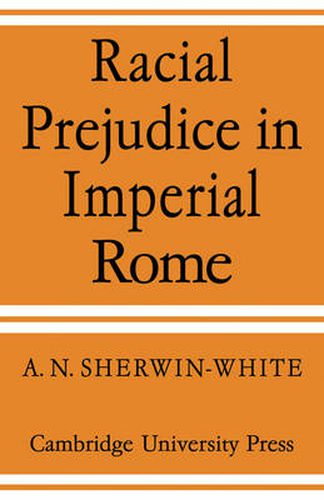Readings Newsletter
Become a Readings Member to make your shopping experience even easier.
Sign in or sign up for free!
You’re not far away from qualifying for FREE standard shipping within Australia
You’ve qualified for FREE standard shipping within Australia
The cart is loading…






Although Roman Imperialism unified a diversity of peoples into a centralised political unit, racial and cultural prejudice persisted. It took forms of varying significance, ranging from a lawyer’s gibes at Celts for their long hair to the massacre of 10,000 Jews at Damascus during the reign of Nero. Sherwin-White has taken as his theme the literary evidence for racial tension during the Roman Imperial period. He begins by considering the criticisms by Tacitus, Strabo and Caesar of the Celts and Germans encountered during the annexation of Northern Gaul and Britain. These criticisms, which were sometimes hostile and political, principally concern celtic barbarism. They offer a stark contrast to the subsequent analysis of the antipathy between Romans and Greeks in the artificial atmosphere of Rome, and the anti-semitism characteristic of certain cities of the Eastern provinces. The author’s synthesis of numerous relevant references in the classical literature makes a notable contribution to Roman studies.
$9.00 standard shipping within Australia
FREE standard shipping within Australia for orders over $100.00
Express & International shipping calculated at checkout
Although Roman Imperialism unified a diversity of peoples into a centralised political unit, racial and cultural prejudice persisted. It took forms of varying significance, ranging from a lawyer’s gibes at Celts for their long hair to the massacre of 10,000 Jews at Damascus during the reign of Nero. Sherwin-White has taken as his theme the literary evidence for racial tension during the Roman Imperial period. He begins by considering the criticisms by Tacitus, Strabo and Caesar of the Celts and Germans encountered during the annexation of Northern Gaul and Britain. These criticisms, which were sometimes hostile and political, principally concern celtic barbarism. They offer a stark contrast to the subsequent analysis of the antipathy between Romans and Greeks in the artificial atmosphere of Rome, and the anti-semitism characteristic of certain cities of the Eastern provinces. The author’s synthesis of numerous relevant references in the classical literature makes a notable contribution to Roman studies.